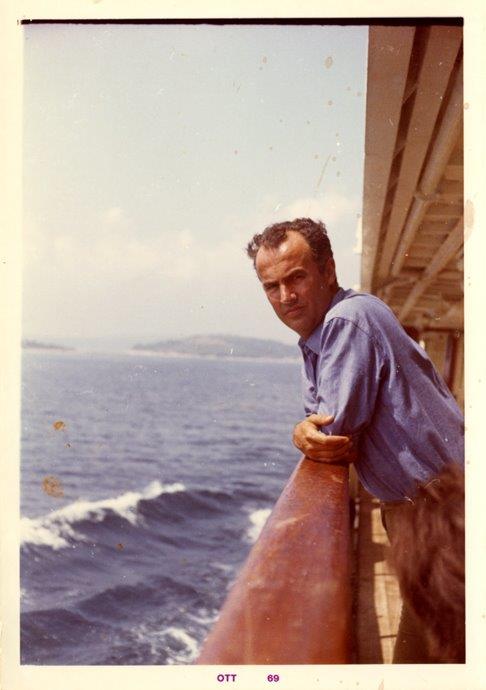Na indrukwekkende retrospectieven gewijd aan John Cage (2012) en Edgard Varèse (2009) plaatste het Holland Festival dit jaar de Venetiaanse componist Luigi Nono in de schijnwerpers. Onder de titel ‘Trilogie van het sublieme’ vormde de imposante Gashouder het epicentrum van drie avondvullende concerten, klonken er korte ‘Nono interventions’ in de onderdoorgang van het Rijksmuseum, werd een tweedaags symposium rond Nono georganiseerd, en richtte zijn weduwe Nuria een expositie in onder de titel ‘Maestro di suoni i silenzi’.
Met dergelijke grootschalige projecten heeft scheidend artistiek directeur Pierre Audi het Holland Festival weer op de kaart gezet: wie in het culturele circuit een beetje mee wil tellen toog afgelopen weekend naar het Westergasterrein. Drie avonden lang was de Gashouder – een ‘industriële kathedraal’ met een capaciteit van zo’n duizend mensen – zo goed als uitverkocht en het publiek reageerde onverminderd enthousiast.
Zelf kon ik maar twee concerten bijwonen: de openingsavond, met het bijna twee-en-een-half uur durende Prometeo en de slotavond met twee delen uit de cyclus Caminantes. Beide avonden leidde de Duitse dirigent Ingo Metzmacher het SWR Sinfonieorchester Baden-Baden und Freiburg en de zangers van de Schola Heidelberg (op donderdag bijgestaan door dirigent Matilda Hofman). Op donderdagavond traden ook solisten aan uit het Duitse ensemble recherche, op zondag werden de krachten gebundeld met het Nederlandse koor Cappella Amsterdam onder leiding van hun eigen chef-dirigent Daniel Reuss.
Naast het hoofdpodium zijn rondom het publiek plankieren opgetrokken op verschillende hoogten, met daarop kleinere ensembles in wisselende formaties. Zo wordt de gangbare hiërarchie van het luisteren, met een orkest óp het podium en het publiek ervóór, doorbroken en wordt de luisteraar zelf in het centrum van de muziek geplaatst. Nono streefde er als overtuigd communist niet alleen naar de grenzen te slechten tussen haves en have-nots, maar ook tussen de klank en zijn ontvanger. Hiertoe wordt ook elektronica ingezet, die werd ontworpen en aangestuurd door de Zwitserse geluidsregisseur André Richard, met wie Nono veel heeft samengewerkt.
Door de vernuftige manier waarop de elektronica de fysieke klanken manipuleert vervaagt hun profilering. Zo ontstaat een totaalbeeld waar je je als toehoorder geheel in kunt onderdompelen. Nono betoont zich inderdaad ‘een meester van klanken en stilte’, zoals zijn weduwe Nuria Schoenberg haar tentoonstelling doopte. Zangers en instrumentalisten bewegen zich vaak op de rand van de stilte en gaandeweg ontstaat het gevoel omringd te worden door stemmen uit een schimmenrijk.

De zacht aanzwellende en weer wegstervende klankflarden creëren een sterk rituele sfeer die soms herinnert aan een kerkdienst, zeker wanneer we referenties horen aan het gregoriaanse gezang of de meerkorige polyfonie van de gebroeders Gabrieli. Gisteravond voerde Daniel Reuss Cappella Amsterdam ook daadwerkelijk aan in het Kyrie en Gloria uit de Sacrae symphoniae van Giovanni Gabrieli, die fungeerden als omlijsting van Nono’s ‘No hay caminos, hay che caminar’ waarmee het concert opende.
De titel is ontleend aan een spreuk die Nono ooit op een kloostermuur in Toledo las en betekent zoveel als ‘Er zijn geen wegen, er is slechts het voortgaan’. Dit aforisme is tevens een fraaie metafoor voor de muziek van Nono, die voortdurend op zoek lijkt te zijn naar – ja, naar wat eigenlijk? De in de ruimte zwevende klanken zijn vaak van een onaardse schoonheid, waarbij ijl engelengezang slechts een enkele maal wordt doorbroken door meer laag bij de grondse koper- of slagwerkklanken.
De muziek is oorstrelend en bedwelmend, maar lijkt zich voortdurend in cirkels te bewegen waardoor zij een statisch karakter krijgt. Als luisteraar verlies je elk gevoel voor richting en ga je verdwaasd ronddolen door het schitterende, maar op den duur wat eenvormige klankbouwwerk dat Nono optrekt. De subtitel ‘tragedie van het luisteren’ lijkt ongewild te verwijzen naar dit verlies aan houvast, want Nono streefde juist naar een nieuwe, actieve manier van luisteren, die ons tot betere en socialere mensen zou maken. Het is de vraag of hij daarin slaagt: wij worden eerder in slaap gesust dan wakker geschud door de veelal – bewust – onverstaanbare teksten.
Maar het blijft een bijzondere ervaring, en misschien moeten we Nono’s muziek ook maar gewoon ondergaan in plaats van proberen haar te doorgronden.
